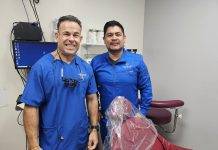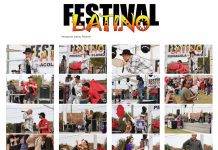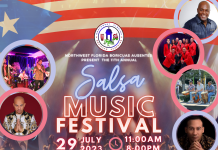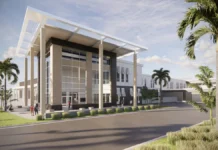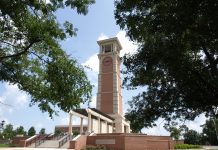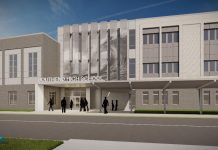Proyecto de participación comunitaria del Smithsonian sobre prejuicios implícitos en Pensacola MESS Hall
El Pensacola MESS Hall anunció hoy que albergará “The Bias Inside Us” del 15 de julio al 15 de agosto. El proyecto de participación comunitaria del Servicio de Exhibición Itinerante de la Institución Smithsonian (SITES) creará conciencia sobre las ciencias sociales y la psicología del sesgo implícito, el impacto de este sesgo y lo que la gente puede hacer al respecto.
“The Bias Inside Us” presenta una exhibición itinerante que sirve como pieza central para los programas y actividades locales. A través de imágenes convincentes, interactivos prácticos y poderosos testimonios y videos, la exposición revela y desmitifica el concepto de sesgo. La exposición presenta seis secciones: Introducción, La ciencia del prejuicio, El prejuicio en la vida real, Consecuencias graves: el prejuicio nos rodea, #RetrainYourBrain y Reflexión personal.
Según el Instituto Nacional de Salud, el sesgo implícito es una forma de sesgo que se produce de forma automática e involuntaria y que, sin embargo, afecta los juicios, las decisiones y los comportamientos. La investigación ha demostrado que el sesgo implícito puede representar una barrera para reclutar y retener una fuerza laboral científicamente diversa.
Los visitantes explorarán los bloques fundamentales del sesgo, la psicología de cómo se forma y cómo influye en los comportamientos tanto consciente como inconscientemente. Los elementos interactivos muestran cómo aparecen los prejuicios implícitos y explícitos en el mundo y cómo los prejuicios influyen en los sistemas y políticas que tienen consecuencias para muchas personas y comunidades. Una experiencia interactiva invita a los visitantes a pensar en cómo se refleja el sesgo en el diseño de productos, la publicidad, la arquitectura y la tecnología. Entre los videos de la exposición hay una serie que presenta ocho voces con diversas perspectivas que comparten experiencias personales con prejuicios.
La exposición también cuenta con el proyecto Humanae de la fotógrafa española Angélica Dass, que reflexiona sobre el color de la piel que desafía el concepto de raza. En este trabajo, Dass documenta los verdaderos colores de la humanidad a través de retratos, en lugar de las etiquetas “blanco,” “rojo,” “negro” y “amarillo.”
Para ampliar la discusión, el martes 8 de agosto, el MESS Hall realizará una presentación especial sobre el sesgo en la inteligencia artificial. Esta conferencia será presentada por el Dr. Brent Venable, Director y Profesor de Ciencias de la Computación, Programa de Sistemas Inteligentes y Robótica, Universidad de West Florida e IHMC.
“El sesgo es parte del ser humano,” dijo Myriam Springuel, directora de SITES y Smithsonian Affiliations. “Nuestro objetivo a través de “The Bias Inside Us” es ayudar a las personas a comprender y contrarrestar su sesgo implícito y ayudar a las comunidades a prosperar a través de la conversación y una mayor comprensión.”
El apoyo local brindado por Sunday’s Child está asegurando que los conceptos de prejuicio en esta exhibición lleguen a más de nuestra comunidad. Con su apoyo, MESS Hall creó un programa de divulgación único, “¿Dónde encaja?,” Diseñado para estudiantes de primaria. Este programa involucra a los estudiantes en actividades prácticas que los involucran en la exploración de la percepción, los patrones y la perspectiva, mirando desde diferentes ángulos y descubriendo cómo los científicos analizan el mundo que los rodea. Este programa se brindará sin costo a diez campamentos de verano, además de presentaciones en bibliotecas y otros lugares. Además, Sunday’s Child está apoyando las visitas a la exhibición por parte de organizaciones seleccionadas, que atienden tanto a adultos como a jóvenes, para ampliar la conversación comunitaria sobre los prejuicios.
“Dentro de nuestra misión de Sunday’s Child están las palabras “promover la igualdad e inspirar la inclusión” y eso es exactamente lo que “The Bias Inside Us” ofrece a nuestra comunidad,” dice Jacey Cosentino, presidente de la junta de Sunday’s Child. “Toma una inmersión profunda en por qué formamos ciertas opiniones y estamos condicionados a pensar de cierta manera. Siento qué si podemos utilizar la educación como la que brinda el MESS Hall para comprender mejor la naturaleza humana, entonces podemos tener las herramientas para ayudar a todos a sentirse bienvenidos e incluidos.”
“The Bias Inside Us” se basa en la investigación científica y el trabajo educativo de los psicólogos Mahzarin R. Banaji de la Universidad de Harvard y Anthony G. Greenwald, profesor emérito de la Universidad de Washington. Ellos definieron el término “sesgo implícito” a través de su trabajo sobre los procesos mentales inconscientes y conscientes. Su libro Blindspot: Hidden Biases of Good People (Delacorte Press, 2013) explora los prejuicios que tienen las personas en función de su exposición a actitudes culturales en áreas como el género, la raza, la clase social y el estado de discapacidad.
Smithsonian Community Engagement Project on Implicit Bias Coming to Pensacola MESS Hall
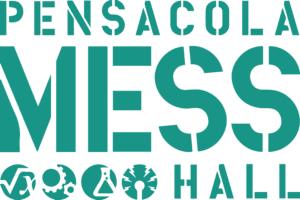 The Pensacola MESS Hall announced today that they will host “The Bias Inside Us” from July 15 to August 15. The community engagement project from the Smithsonian Institution Traveling Exhibition Service (SITES) will raise awareness about the social science and psychology of implicit bias, the impact of this bias, and what people can do about it.
The Pensacola MESS Hall announced today that they will host “The Bias Inside Us” from July 15 to August 15. The community engagement project from the Smithsonian Institution Traveling Exhibition Service (SITES) will raise awareness about the social science and psychology of implicit bias, the impact of this bias, and what people can do about it.
“The Bias Inside Us” features a traveling exhibition that serves as the centerpiece for local programs and activities. Through compelling images, hands-on interactives and powerful testimonials and videos, the exhibition unpacks and demystifies the concept of bias. The exhibition features six sections: Introduction, The Science of Bias, Bias in Real Life, Serious Consequences—Bias is All Around Us, #RetrainYourBrain and Personal Reflection.
According to the National Institute of Health, Implicit bias is a form of bias that occurs automatically and unintentionally, that nevertheless affects judgments, decisions, and behaviors. Research has shown implicit bias can pose a barrier to recruiting and retaining a diverse scientific workforce.
Visitors will explore the foundational blocks of bias, the psychology of how it forms, and how it influences behaviors both consciously and unconsciously. Interactive elements display how implicit and explicit bias show up in the world and how bias influences systems and policies that have consequences for many people and communities. One interactive experience invites visitors to think about how bias is reflected in product design, advertising, architecture, and technology. Among the videos in the exhibition is a series that features eight voices from diverse perspectives sharing personal experience with bias.
The exhibition also features Spanish photographer Angélica Dass’s Humanae project, which reflects on the color of skin that challenges the concept of race. In this work, Dass documents humanity’s true colors through portraits, rather than the labels “white,” “red,” “black,” and “yellow.”
To broaden the discussion, on Tuesday, August 8th the MESS Hall will host a special presentation on Bias in Artificial Intelligence. This lecture will be presented by Dr. Brent Venable, Professor of Computer Science and Director, Intelligent Systems and Robotics Program, University of West Florida and IHMC.
“Bias is part of being human,” said Myriam Springuel, director of SITES and Smithsonian Affiliations. “Our goal through ‘The Bias Inside Us’ is to help individuals understand and counter their implicit bias and help communities thrive through conversation and greater understanding.”
Local support provided by Sunday’s Child is ensuring that the concepts of bias in this exhibit reach more of our community. With their support, the MESS Hall created an unique outreach program, “Where Does It Fit?,” designed for elementary learners. This program engages students in hands-on activities that engage learners in exploring perception, patterns, and perspective, looking from different angles and discovering how scientists analyze the world around them. This program will be provided at no cost to ten summer camps, plus presentations at libraries and other venues. Additionally, Sunday’s Child is supporting visits to the exhibit by select organizations, serving both adults and youth, to broaden the community conversation about bias.
“Within our mission of Sunday’s Child are the words ‘promote equality and inspire inclusion’ and that is exactly what ‘The Bias Inside Us’ is offering our community,” says Jacey Cosentino, president of the board of Sunday’s Child. “It takes a deep dive into why we form certain opinions and are conditioned to think certain ways. I feel if we can utilize education like the MESS Hall is providing to better understand human nature then we can have the tools to help everyone feel they are welcomed and included.”
“The Bias Inside Us” draws from the scientific research and educational work by psychologists Mahzarin R. Banaji of Harvard University and Anthony G. Greenwald, professor emeritus at the University of Washington. They defined the term “implicit bias” through their work on unconscious and conscious mental processes. Their book Blindspot: Hidden Biases of Good People (Delacorte Press, 2013) explores the biases people carry based on their exposure to cultural attitudes on areas such as gender, race, social class and disability status.



